|
|
|
Sort Order |
|
|
|
Items / Page
|
|
|
|
|
|
|
| Srl | Item |
| 1 |
ID:
072481
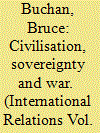

|
|
|
|
|
| Publication |
2006.
|
| Summary/Abstract |
In recent international relations (IR) literature and foreign policy, the concept of civilisation has enjoyed a surprising revival. Its recent use, however, has had little reference to those who did most to introduce it into modern thought, the thinkers of the Scottish Enlightenment. A re-examination of their thought suggests the need for a more nuanced view of civilisation, one that appreciates that the promise of domestic peace that comes with civilisation is also laden with the peril of war and new dynamics of international order. This article will focus on how David Hume (1711-76), William Robertson (1721-93), Adam Smith (1723-90) and Adam Ferguson (1723-1816) framed their understanding of civilisation and the civilising process in Europe. It will be argued that they were animated by the need to identify the processes at work in reshaping Europe, giving rise to a new international order of civilised societies and mighty sovereign states. Civilisation thus emerged as a process not simply of domestic refinement and pacification, but of the emergence of a new kind of international order between militarily powerful, 'civilised' and 'civilising' sovereign states with enhanced capacities for waging war.
|
|
|
|
|
|
|
|
|
|
|
|
|
|
|
|
| 2 |
ID:
075100
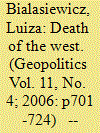

|
|
|
|
|
| Publication |
2006.
|
| Summary/Abstract |
The 'War on Terror' has justified a whole new set of re-territorialisations of security and identity, also in the 'West'. In this paper, I highlight one particularly powerful aspect of the idea of the 'West under threat': one wedded to the idea of a demographic-reproductive menace. Such ideas are not only the prerogative of extremist fringes, for the two authors whose work is discussed in this piece are very much part of the mainstream: Samuel Huntington, whose latest book Who Are We? America's Great Debate focuses on the 'deconstruction' of American identity and the threat represented by hyper-fertile immigrant populations and Italian writer-journalist Oriana Fallaci, whose two most recent books have launched an offensive against the 'Islamic Reverse Crusade' that threatens to 'submerge and subjugate' Europe.
Certainly, the intimations of a 'threat' to the West are in no way new, nor are they a unique product of the 'War on Terror'. What is new, however, is the force with which they are being articulated today and the ways in which they are entering into popular circulation, in both Europe and America. What is more, on both sides of the Atlantic, those raising the sound of alarm for 'The Death of the West' prescribe not only a re-affirmation of (Western) ideals, but also - and increasingly - a set of policies for the biological survival of the West. 'The Death of the West' is thus not only a parable of political and geopolitical decline, but also a morality play regarding real deaths and, especially, real births.
|
|
|
|
|
|
|
|
|
|
|
|
|
|
|
|
| 3 |
ID:
119845
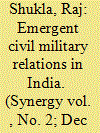

|
|
|
| 4 |
ID:
158012


|
|
|
|
|
| Summary/Abstract |
Harvard professor Samuel P. Huntington has frequently been considered a Vietnam War hawk. His observation that ‘forced-draft urbanization’ might help the United States win the war has come to define his engagement in contemporary strategic debates. This essay argues that both Huntington’s academic work and his private policy advice to the U.S. Government in fact urged a political settlement to the conflict. It argues that in spite of this, Huntington refused to break publicly with the U.S. policy because of his wider concern over what he saw as a crisis of authority in the U.S. foreign policy and governing institutions in the era.
|
|
|
|
|
|
|
|
|
|
|
|
|
|
|
|
| 5 |
ID:
067166
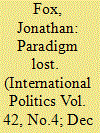

|
|
|
| 6 |
ID:
093946
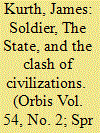

|
|
|
|
|
| Publication |
2010.
|
| Summary/Abstract |
The major military challenge that the United States faces today is the war in Afghanistan. The U.S. military is engaged in a grueling counterinsurgency campaign against the Islamist movement known as the Taliban, which is based among Pashtun tribes in Southeastern Afghanistan and Northwestern Pakistan, who have never been permanently subdued by a foreign military force. This challenge comes in the wake of that other grueling counterinsurgency war that the U.S. military has had to conduct in Iraq, where its chief adversary was the Islamist movement known as al Qaeda in Mesopotamia. Moreover, the challenge in Afghanistan comes on what could be the eve of an impending military challenge, perhaps even a war, with Iran, as that Islamist state relentlessly moves toward acquiring nuclear weapons. In its entire history of two- and-a-quarter centuries, the United States has never been engaged in an unbroken succession of three wars, in three different countries. Together, the U.S. wars with or within Islamist countries add up to what is a "long war," indeed.
|
|
|
|
|
|
|
|
|
|
|
|
|
|
|
|
| 7 |
ID:
141167


|
|
|
|
|
| Summary/Abstract |
The theoretical discourse in civil–military relations tends to perpetuate the notion that efficiency of military organizations is often negatively affected by the influence of domestic ideological factors. Societal norms are frequently portrayed as antithetical to the functional imperatives of the military. This article questions this notion and argues that an effective form of military organization can be produced by incorporating ethical norms of domestic society into its defense organization. To understand the role of societal ethical imperatives in defense policy, the Kantian model of societal–military relations is introduced here. This model emphasizes the normative character of military missions and suggests that its effective fulfillment requires an institutional culture consistent with such a mission. This is demonstrated in the case studies of West German rearmament and the post–Cold War transformation of the Bundeswehr. These empirical cases demonstrate that the societal ethical norms should be considered integral to military functional requirements.
|
|
|
|
|
|
|
|
|
|
|
|
|
|
|
|
|
|
|
|
|